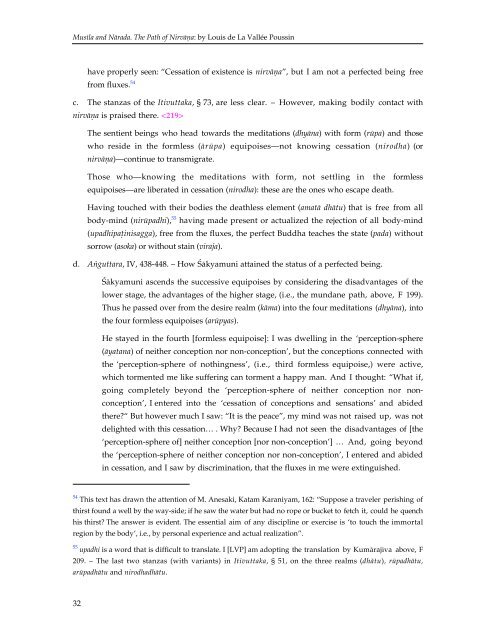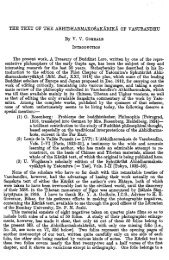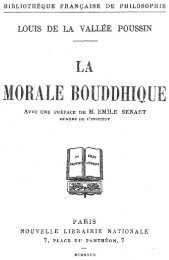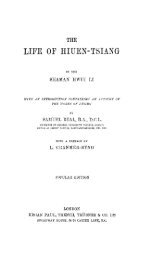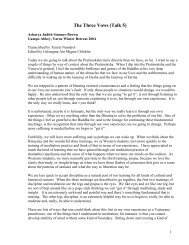La Vallée Poussin Musīla and Nārada. The Path - Gampo Abbey
La Vallée Poussin Musīla and Nārada. The Path - Gampo Abbey
La Vallée Poussin Musīla and Nārada. The Path - Gampo Abbey
Create successful ePaper yourself
Turn your PDF publications into a flip-book with our unique Google optimized e-Paper software.
Musıla <strong>and</strong> N›rada. <strong>The</strong> <strong>Path</strong> of Nirv›˚a: by Louis de <strong>La</strong> <strong>Vallée</strong> <strong>Poussin</strong><br />
32<br />
have properly seen: “Cessation of existence is nirv›˚a”, but I am not a perfected being free<br />
from fluxes. 54<br />
c. <strong>The</strong> stanzas of the Itivuttaka, § 73, are less clear. – However, making bodily contact with<br />
nirv›˚a is praised there. <br />
<strong>The</strong> sentient beings who head towards the meditations (dhy›na) with form (rÒpa) <strong>and</strong> those<br />
who reside in the formless (›rÒpa) equipoises—not knowing cessation (nirodha) (or<br />
nirv›˚a)—continue to transmigrate.<br />
Those who—knowing the meditations with form, not settling in the formless<br />
equipoises—are liberated in cessation (nirodha): these are the ones who escape death.<br />
Having touched with their bodies the deathless element (amat› dh›tu) that is free from all<br />
body-mind (nirÒpadhi), 55 having made present or actualized the rejection of all body-mind<br />
(upadhipa˛inisagga), free from the fluxes, the perfect Buddha teaches the state (pada) without<br />
sorrow (asoka) or without stain (viraja).<br />
d. Aºguttara, IV, 438-448. – How ⁄›kyamuni attained the status of a perfected being.<br />
⁄›kyamuni ascends the successive equipoises by considering the disadvantages of the<br />
lower stage, the advantages of the higher stage, (i.e., the mundane path, above, F 199).<br />
Thus he passed over from the desire realm (k›ma) into the four meditations (dhy›na), into<br />
the four formless equipoises (arÒpyas).<br />
He stayed in the fourth [formless equipoise]: I was dwelling in the ‘perception-sphere<br />
(›yatana) of neither conception nor non-conception’, but the conceptions connected with<br />
the ‘perception-sphere of nothingness’, (i.e., third formless equipoise,) were active,<br />
which tormented me like suffering can torment a happy man. And I thought: “What if,<br />
going completely beyond the ‘perception-sphere of neither conception nor non-<br />
conception’, I entered into the ‘cessation of conceptions <strong>and</strong> sensations’ <strong>and</strong> abided<br />
there?“ But however much I saw: “It is the peace”, my mind was not raised up, was not<br />
delighted with this cessation… . Why? Because I had not seen the disadvantages of [the<br />
‘perception-sphere of] neither conception [nor non-conception’] … And, going beyond<br />
the ‘perception-sphere of neither conception nor non-conception’, I entered <strong>and</strong> abided<br />
in cessation, <strong>and</strong> I saw by discrimination, that the fluxes in me were extinguished.<br />
54 This text has drawn the attention of M. Anesaki, Katam Karaniyam, 162: “Suppose a traveler perishing of<br />
thirst found a well by the way-side; if he saw the water but had no rope or bucket to fetch it, could he quench<br />
his thirst? <strong>The</strong> answer is evident. <strong>The</strong> essential aim of any discipline or exercise is ‘to touch the immortal<br />
region by the body’, i.e., by personal experience <strong>and</strong> actual realization”.<br />
55 upadhi is a word that is difficult to translate. I [LVP] am adopting the translation by Kum›rajıva above, F<br />
209. – <strong>The</strong> last two stanzas (with variants) in Itivuttaka, § 51, on the three realms (dh›tu), rÒpadh›tu,<br />
arÒpadh›tu <strong>and</strong> nirodhadh›tu.


